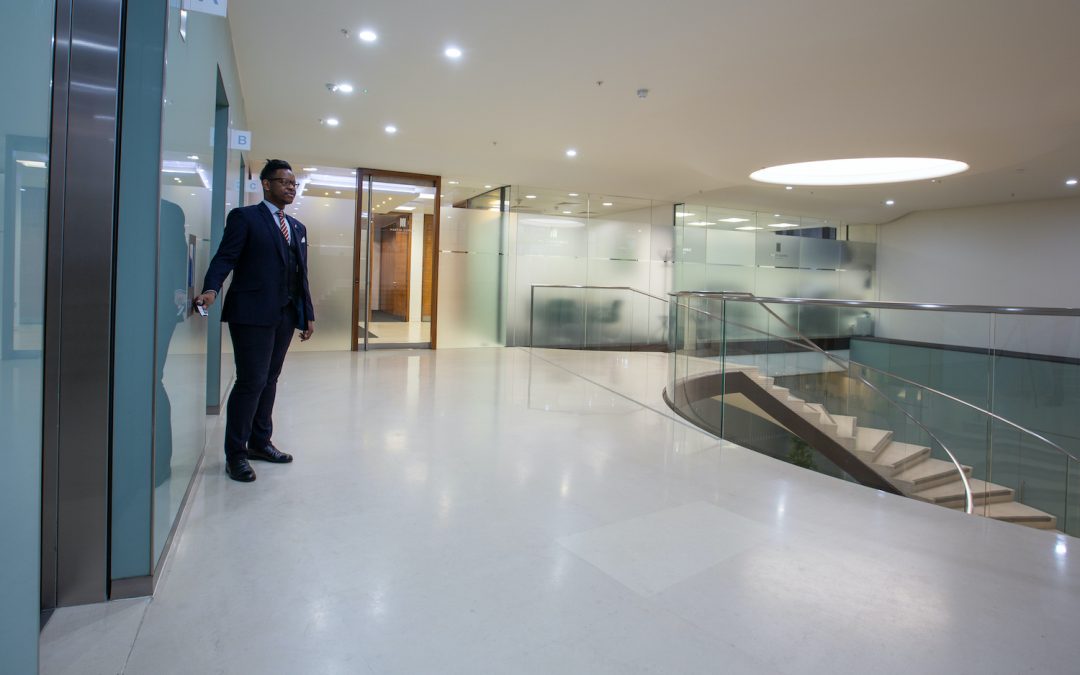There’s no doubt that the Covid-19 pandemic has caused a fundamental security industry change. Security officers are rightly being recognised as critical workers in the fight against the pandemic. Prior to this many were an invisibile workforce. Our security officers have been on the front-line throughout this time, while the rest of us worked safely at home.
Adapting to a new role
But the industry itself has also changed – and will continue to change. Many of our security officers have been busy welcoming a handful of essential workers to their buildings during lockdown. Their role is now adapting to plan for the future of the post-pandemic workplace. We’re working with our clients to develop risk assessments around the safe return to work. While some buildings are further along that route than others, they all recognise that they’re going to need to make changes to keep people safe.
We’re helping to redesign reception areas to provide one-way directional control. We’re installing footprint stickers on floors and mats, Perspex screens at reception desks, tape and barriers to direct people, and foot pump hand sanitisers. And we’re retraining our people – online and face-to-face on site – to manage the new security normal.
Essential workers
Security officers’ positions are adapting as quickly as the layout of our offices change. They are taking leading roles in managing and supporting people to adapt to the new normal. This is in additon to the usual focus on access control, protecting the building and providing a warm welcome. They are on the front line welcoming people back into the workplace and reinforcing the social distancing measures. They’re walking people through the rules and new layout, explaining what they need to do and not do. They’re taking people’s temperatures with hand-held thermal imaging equipment – and then having difficult conversations with people who appear outside of the allowed range.
In scenarios where teams are returning to work in split shifts or staggered hours they’re making sure that the right employees are allowed in the building at the right time, but politely turning away those who aren’t expected in. Many are using counters to ensure the right occupancy levels and reporting if these are exceeded. They’re directing the one or two-people-per-lift policy which, in high-rises can be a challenge. That often involves going back to pressing lift buttons themselves to avoid too many people touching the same place and spreading the virus.
For those people who’ve worked through the pandemic, or those who have been back some time and may become relaxed about the social distancing measures, they’re having quiet conversations to remind them. They’re occasionally called to referee between people with very different approaches to social distancing in a building.
Security officers are working hard to keep everyone safe – all while trying to ensure their own safety.
Industry perception
We believe the perception of security officers will also change – positively. Just as people are recognising how crucial the cleaning team are to their continued safety and overall business continuity, individuals and businesses will appreciate the role security and reception teams play in supporting them through this challenging period. The industry’s position as key workers should not be forgotten and it’s up to all of us in the sector to make sure that we rise to that challenge.
This pandemic will continue to place a burden on our security officers. But it will also result in a huge change in how they’re received in the post-Covid world. That can only be a good thing.
This blog was first published on the Infologue website https://www.infologue.com/editorial/theo-nicolaou-how-will-the-security-sector-change-post-pandemic/

